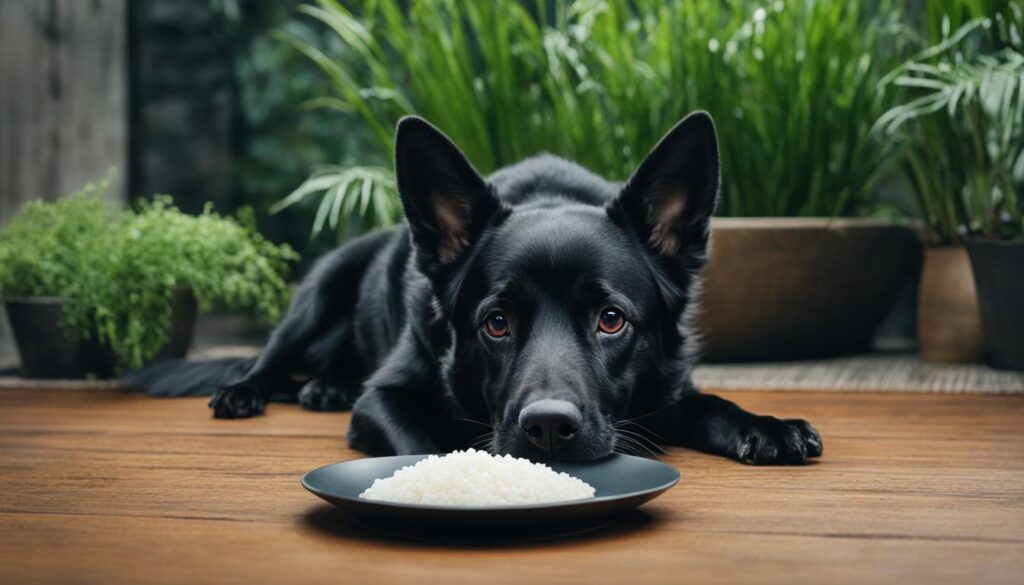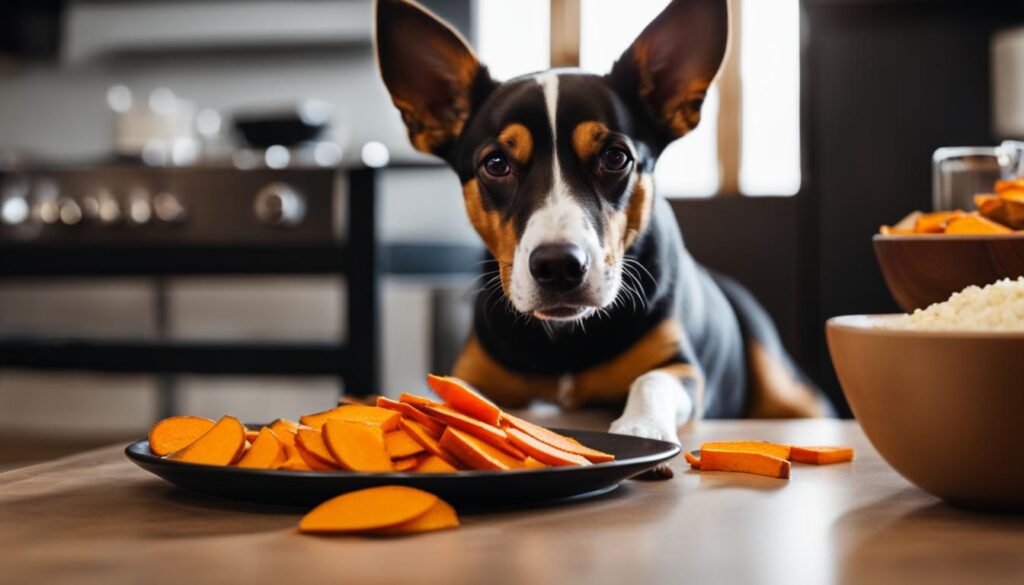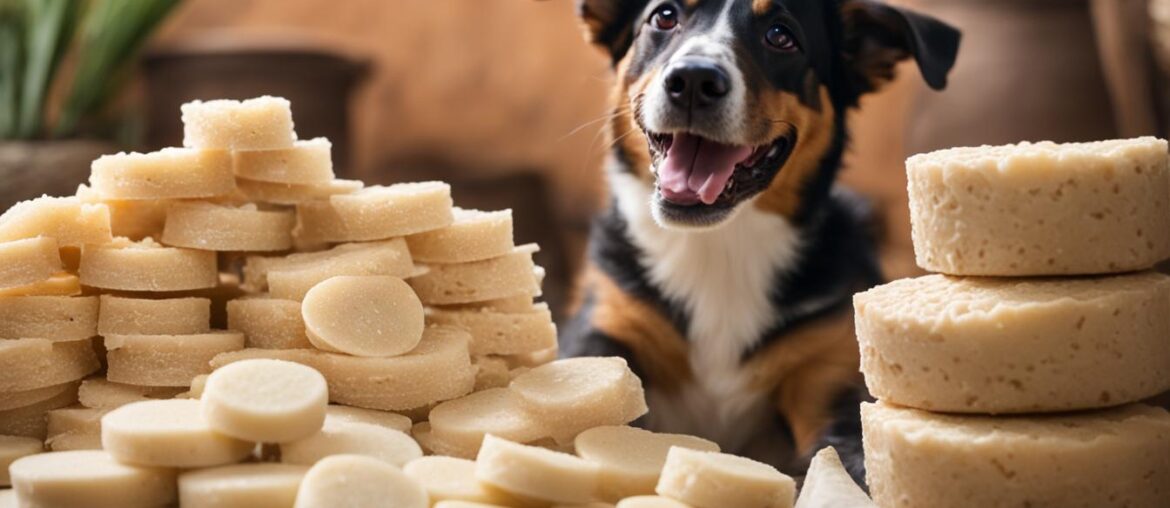Welcome to my article on rice cakes for dogs. As a pet owner, you may be wondering if it’s safe to share this popular human snack with your furry friend. I’ve done the research to provide you with the information you need to make an informed decision about feeding rice cakes to your dog.
Dogs can eat plain rice cakes in moderation as a treat. Rice cakes made with brown or white rice and minimal ingredients are generally safe for dogs to consume. They offer a crunchy texture that dogs may enjoy and are low in fat. However, it’s important to note that rice cakes should not make up a significant portion of a dog’s diet as they lack nutritional value.
While rice cakes can be a tasty and dog-friendly snack option, there are some risks associated with feeding them to dogs. Excessive consumption of rice cakes can lead to digestive issues such as constipation or diarrhea. Rice cakes may also contain high sodium content, which can be detrimental to a dog’s health, particularly for dogs with pre-existing kidney conditions or older dogs.
If you’re looking for alternatives to rice cakes, there are several options available. Opt for dog-friendly fruits and vegetables like carrots or apple slices. Additionally, commercially available dog treats that are specifically formulated to meet a dog’s nutritional needs can be a good choice. Homemade treats using plain cooked rice or other dog-friendly ingredients can also provide a healthier alternative.
When introducing rice cakes to your dog, it’s important to start with small portions to ensure they can tolerate them well. Monitor their digestive health and any allergic reactions. Gradually increase the portion size if no adverse effects are observed. Remember to choose plain rice cakes without additives or seasonings and consult with your veterinarian before introducing any new food item to your dog’s diet.
Key Takeaways:
- Dogs can eat plain rice cakes in moderation as a treat.
- Rice cakes made with brown or white rice and minimal ingredients are generally safe for dogs.
- Rice cakes lack nutritional value and should not replace a balanced and nutritious diet.
- Excessive consumption of rice cakes can lead to digestive issues and high sodium content may be harmful to certain dogs.
- There are alternative treat options available such as dog-friendly fruits and vegetables, commercial dog treats, and homemade treats.
Can Dogs Eat Rice Cakes?

Dogs can safely consume plain rice cakes as long as they are free of additives and flavorings. Whether made with brown or white rice, these minimal ingredient snacks can be a dog-friendly treat. Rice cakes offer a desirable crunch that dogs may enjoy and can be a suitable occasional reward. However, it’s important to remember that rice cakes should only be given in moderation and should not replace a balanced and nutritious diet for dogs.
Rice cakes can serve as a healthier alternative to high-calorie treats, but they should not be relied upon as a significant source of nutrition for dogs. While they are low in fat and provide a crunchy texture, they lack essential nutrients that dogs need to thrive. Therefore, it’s essential to incorporate other food sources with more comprehensive nutritional profiles into their diet.
When considering rice cakes for dogs, it’s crucial to ensure they are plain and free from any potentially harmful ingredients. Flavored or seasoned rice cakes may contain additives that can be detrimental to a dog’s health. Always check the ingredient list before offering rice cakes to your furry companion.
Can Dogs Safely Consume Rice Cakes?
The answer is yes, as long as the rice cakes are plain and free from additives or flavorings. Here is a summary of the key points:
- Dogs can eat plain rice cakes made with brown or white rice and minimal ingredients.
- Rice cakes should be given to dogs in moderation as a treat and should not replace a balanced and nutritious diet.
- Avoid flavored or seasoned rice cakes, as they may contain harmful ingredients for dogs.
It’s important to remember that every dog is unique, and what may be safe for one dog may not be suitable for another. Always consult with your veterinarian before introducing any new food item to your dog’s diet to ensure it is safe and appropriate for their specific needs.
| Risks of Feeding Rice Cakes to Dogs | Alternatives to Rice Cakes for Dogs |
|---|---|
|
|
The Benefits of Rice Cakes for Dogs

Rice cakes can be a nutritious and satisfying snack for dogs when given in moderation. They offer several benefits that make them a favorable choice for dog owners looking for healthier treat options.
1. Low-Calorie and Low-Fat
Dogs, like humans, need to maintain a healthy weight to prevent obesity and related health issues. Rice cakes are low in calories and fat, making them a suitable treat for dogs on a weight management program or those prone to weight gain.
2. Crunchy Texture
Dogs enjoy the crunch and texture of rice cakes, providing them with a satisfying chewing experience. Chewing can help dogs relax, reduce anxiety, and promote dental health by removing plaque and tartar buildup.
3. Fiber Content
Rice cakes made with brown rice can contribute a small amount of dietary fiber to a dog’s diet. Fiber plays an essential role in promoting healthy digestion and can help regulate bowel movements.
While rice cakes offer these benefits, it’s important to remember that they should be given as a treat and not as a substitute for a balanced diet. Dogs require a varied and nutrient-rich diet to meet their nutritional needs.
“Rice cakes can provide dogs with a low-calorie and low-fat snack option, offering them a satisfying crunch and contributing some fiber to their diet.”
It’s also crucial to choose rice cakes that are free from additives, flavorings, and excessive sodium, as these ingredients can be harmful to dogs. Always check the label and opt for plain, dog-friendly rice cakes.
| Benefits of Rice Cakes for Dogs | |
|---|---|
| Low in calories and fat | Helps maintain a healthy weight |
| Crunchy texture | Provides dental stimulation |
| Contains fiber | Promotes healthy digestion |
When introducing rice cakes to your dog, start with small portions to ensure they do not have any adverse reactions. Monitor their digestion and overall well-being after consuming rice cakes. If any negative symptoms, such as vomiting or diarrhea, occur, discontinue feeding rice cakes immediately and consult a veterinarian.
In conclusion, rice cakes can be a dog-friendly snack that provides a satisfying crunch, low-calorie option, and some fiber. However, they should be given in moderation and as part of a balanced diet. It’s always important to prioritize your dog’s overall nutritional needs and consult with a veterinarian for personalized guidance.
Are Rice Cakes Nutritious for Dogs?

While rice cakes can be a low-calorie and low-fat snack for dogs, they do not offer significant nutritional value. Rice cakes primarily consist of carbohydrates and may provide a small amount of fiber. While they can be a crunchy and enjoyable treat for dogs, they should not be relied upon as a source of essential nutrients.
Dogs require a balanced and nutritious diet that includes a variety of food sources to meet their specific nutritional needs. While rice cakes can be given to dogs as an occasional treat, it is important to provide them with a diet that includes other food options with more comprehensive nutritional profiles.
| Nutrient | Amount per Serving |
|---|---|
| Calories | Approximately 35-40 |
| Total Fat | Less than 1g |
| Carbohydrates | Approximately 7-8g |
| Fiber | Less than 1g |
Rice cakes can be a part of a well-rounded treat routine for dogs, but they should not replace a balanced diet that includes protein, fats, vitamins, and minerals. By providing a diverse range of dog-friendly foods, you can ensure that your furry friend receives all the necessary nutrients for their overall health and well-being.
Risks of Feeding Rice Cakes to Dogs
Although rice cakes are generally safe for dogs, it is important to be aware of the potential risks associated with feeding them to our furry friends. While they may seem like a tasty and harmless treat, there are a few considerations to keep in mind when offering rice cakes to dogs.
Digestive Issues
One of the primary risks of feeding rice cakes to dogs is the potential for digestive issues. Dogs have sensitive digestive systems, and consuming rice cakes in excess can lead to problems such as constipation or diarrhea. As with any new food item, it is essential to introduce rice cakes gradually and monitor your dog’s response.
High Sodium Content
Rice cakes may contain high sodium content, which can be detrimental to a dog’s health. This is particularly concerning for dogs with pre-existing kidney conditions or older dogs who may have reduced kidney function. Excessive sodium intake can increase the risk of dehydration and strain on the kidneys, so it’s important to be mindful of the sodium levels in the rice cakes you offer to your dog.
Allergies and Sensitivities
Just like humans, dogs can have allergies or sensitivities to certain ingredients. Some rice cake varieties may include additional ingredients or flavorings that could potentially trigger an adverse reaction in dogs. It’s important to carefully read the ingredients list and be cautious when introducing rice cakes to dogs with known food allergies or sensitivities.
To ensure the well-being of our canine companions, it’s always recommended to consult with your veterinarian before introducing any new food item, including rice cakes, into your dog’s diet. They can provide personalized advice based on your dog’s specific needs and health condition.
| Risks of Feeding Rice Cakes to Dogs |
|---|
| Digestive Issues |
| High Sodium Content |
| Allergies and Sensitivities |
Alternatives to Rice Cakes for Dogs

If you’re looking for safe and healthy treat options for your dog, there are several alternatives to rice cakes:
- Dog-Friendly Fruits and Vegetables:
- Commercially Available Dog Treats:
- Homemade Treats:
Opt for dog-friendly fruits and vegetables such as carrots or apple slices. These options provide natural sweetness and additional nutritional benefits. Just remember to cut them into bite-sized pieces and remove any seeds or pits that may be harmful to dogs.
Explore the vast range of dog treats available in pet stores or online. Look for treats that are specifically formulated to meet a dog’s nutritional needs. Choose options that use high-quality ingredients and are free from additives, fillers, and artificial flavors.
If you prefer making treats at home, consider using plain cooked rice or other dog-friendly ingredients. You can find numerous recipes online for homemade dog treats that are easy to make and offer a healthier alternative to rice cakes. Just ensure that the ingredients used are safe for dogs.
Sample Recipe: Carrot and Peanut Butter Dog Treats
Here’s a simple recipe for dog-friendly treats using carrots and peanut butter:
Ingredients:
- 1 cup grated carrots
- 1/4 cup peanut butter (make sure it does not contain xylitol)
- 1 cup whole wheat flour
- 1/4 cup water (as needed)
Instructions:
- Preheat the oven to 350°F (175°C) and line a baking sheet with parchment paper.
- In a mixing bowl, combine the grated carrots and peanut butter.
- Add the whole wheat flour and mix well. Add water gradually as needed to form a dough-like consistency.
- Roll out the dough on a floured surface to around 1/4 inch thickness.
- Use cookie cutters to cut out shapes or simply cut the dough into small squares.
- Place the treats on the prepared baking sheet and bake for 15-20 minutes, or until golden brown.
- Allow the treats to cool completely before serving them to your dog.
Remember to consult with your veterinarian before introducing any new treats to your dog’s diet to ensure they are suitable for their specific needs.
Introducing Rice Cakes to Dogs

When it comes to introducing rice cakes to dogs, a gradual approach is essential to ensure their well-being and tolerance. Start by offering small amounts of rice cakes and closely monitor your dog’s digestive health and any signs of allergic reactions. If your dog shows no adverse effects, you can gradually increase the portion size. However, it’s crucial to choose plain rice cakes without any additives or seasonings as they can be harmful to dogs.
Always consult with your veterinarian before introducing any new food item to your dog’s diet. They can provide valuable guidance specific to your dog’s needs and ensure that rice cakes are safe and appropriate for them.
Do’s and Don’ts for Introducing Rice Cakes to Dogs
| Do | Don’t |
|---|---|
| Start with small amounts | Offer flavored rice cakes |
| Monitor digestive health | Give rice cakes as a main meal |
| Watch for allergic reactions | Add seasonings or additives |
| Gradually increase portion size | Replace a balanced diet with rice cakes |
| Consult with your veterinarian | Ignore signs of intolerance or allergies |
Can Dogs Eat Rice?

Dogs can safely consume rice as part of their diet. Rice is often recommended as a bland food option for dogs with digestive issues or those recovering from illness or surgery. When prepared properly, plain cooked rice can provide dogs with much-needed carbohydrates and energy.
White rice, in particular, is easier for dogs to digest compared to other grains. It is a gentle and easily digestible source of carbohydrates that can be beneficial for dogs with sensitive stomachs. However, it is crucial to avoid adding any seasonings or additives to the rice when preparing it for dogs.
Here is a comparison of white rice types commonly used for dogs:
| White Rice Type | Description | Suitability for Dogs |
|---|---|---|
| White Basmati Rice | A long-grain rice with a light and fluffy texture. | Safe for dogs and easy to digest. |
| White Jasmine Rice | A fragrant rice with a soft and sticky texture. | Safe for dogs but may cause slight digestion issues in some dogs. |
| White Arborio Rice | A short-grain rice often used in risotto. | Safe for dogs but may be slightly harder to digest. |
It’s important to note that while rice can be included in a dog’s diet, it should not be the sole source of nutrition. Dogs require a balanced diet that includes other essential nutrients. Rice should be considered as a part of a well-rounded meal plan rather than a standalone food item.
Remember, always consult with your veterinarian before making any significant changes to your dog’s diet. They can provide tailored advice based on your dog’s specific needs and health conditions.
Wrapping Up
In conclusion, while dogs can eat plain rice cakes as a treat in moderation, it’s important to be aware of the potential risks involved. Feeding rice cakes to dogs can lead to digestive issues such as constipation or diarrhea, especially if consumed excessively. Moreover, rice cakes may contain high sodium content, which can be harmful to dogs with kidney conditions or older dogs.
Rice cakes should not be relied upon as a substitute for a balanced and nutritious diet for dogs. Although they offer a low-calorie and low-fat snack option, they do not provide significant nutritional value. To ensure that your dog receives proper nutrition, consider incorporating other dog-friendly treats or fruits and vegetables into their diet.
Alternatives to rice cakes, such as dog-friendly treats or homemade options using plain cooked rice, can provide a healthier alternative for your furry companion. However, it’s always essential to consult with your veterinarian before introducing any new food item or treat to your dog’s diet to ensure it is safe and suitable for their specific needs.
FAQ
Can dogs eat rice cakes?
Dogs can eat plain rice cakes in moderation as a treat. Rice cakes made with brown or white rice and minimal ingredients are safe for dogs to consume.
Are rice cakes safe for dogs?
Yes, rice cakes can be safe for dogs to eat as long as they are plain and free of additives or flavorings.
Are rice cakes nutritious for dogs?
While rice cakes are low in fat and provide a crunch for dogs, they do not offer significant nutritional value and should be given as a treat in moderation.
What are the benefits of rice cakes for dogs?
Rice cakes can serve as a low-calorie and low-fat snack for dogs, providing a healthier alternative to high-calorie treats.
What are the risks of feeding rice cakes to dogs?
Excessive consumption of rice cakes can lead to digestive issues such as constipation or diarrhea. Rice cakes may also contain high sodium content, which can be detrimental to a dog’s health, particularly for dogs with pre-existing kidney conditions or older dogs. Dogs may also have allergies or sensitivities to certain ingredients in rice cakes.
What are the alternatives to rice cakes for dogs?
If you’re looking for safe and healthy treat options for your dog, alternatives to rice cakes can include dog-friendly fruits and vegetables such as carrots or apple slices. Commercially available dog treats specifically formulated to meet a dog’s nutritional needs can also be a good option. Homemade treats using plain cooked rice or other dog-friendly ingredients can provide a healthier alternative to rice cakes.
How should I introduce rice cakes to my dog?
When introducing rice cakes to dogs, it’s important to start with small amounts to ensure they can tolerate them well. Monitor their digestive health and any allergic reactions. Gradually increase the portion size if no adverse effects are observed. Remember to choose plain rice cakes without additives or seasonings. Always consult with your veterinarian before introducing any new food item to your dog’s diet to ensure it is safe and appropriate for their specific needs.
Can dogs eat rice?
Dogs can eat plain rice, and it is often recommended as a bland food option for dogs with digestive issues or recovering from illness or surgery. However, it’s important to avoid adding any seasonings or additives to the rice when preparing it for dogs.
What is the conclusion about rice cakes for dogs?
Dogs can eat plain rice cakes as a treat in moderation, but they should not replace a balanced and nutritious diet. Rice cakes provide a crunch and are low in fat, but they lack significant nutritional value. It’s important to consider the potential risks associated with rice cakes, such as digestive issues, high sodium content, and potential allergies. There are alternative treat options available that provide more nutritional value. Consult with your veterinarian to ensure that rice cakes or any other treats are appropriate for your dog’s specific needs.






